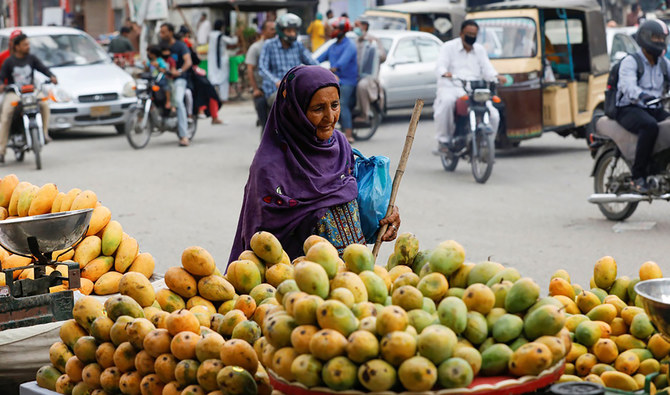KARACHI: Pakistan’s export of mangoes to Arab countries stood at 51,140 tons, or 41 percent of the country’s overall export of the fruit, during the current season, said exporters on Thursday, adding that the country sold more mangoes in the international market during the current season than expected and surpassed its target by 56 percent despite the COVID-19 constraints.
“During the current season, mango export increased by 45,000 tons to 125,000 tons mainly due to our aggressive marketing. The country has earned $72 million in revenue despite several challenges arising out of the COVID-19 pandemic,” Waheed Ahmed, patron-in-chief of the All Pakistan Fruit and Vegetable Exporters, Importers and Merchants Association (PFVA), told Arab News.
Pakistan’s de facto commerce minister, Abdul Razak Dawood, also commended the achievement, saying in a Twitter post: “I congratulate our mango exporters who have been able to achieve this remarkable result. A meeting is being arranged to strategize on a long term for exporting this great Pakistani product. Well done to all.”
Pakistani exporters had set a target of selling 80,000 tons of mangoes in the international market during the current season after the coronavirus outbreak that resulted in global lockdowns and travel suspensions. They are now confident, however, that the overall mango export would reach 150,000 tons since they are hoping to sell an additional 25,000 tons during the next one and a half months.
Mango season starts from May and lasts till the end of October, but Pakistani mangoes reached the Arab lands in June this year due to the coronavirus pandemic.
The 51,140 tons of mango or 41 percent of the country’s overall exports by August 14, 2020, was made to the Middle Eastern countries where, according to the PFVA data, the United Arab Emirates imported 33,019 tons, Oman 11,469 tons, Saudi Arabia 2,997 tons, Qatar 2,875 tons, Bahrain 1,685 tons, and Kuwait 580 tons.
Pakistani officials said that Arabs had developed the taste for Pakistani mangoes and the country was hoping to export even more of the fruit during the next season.
“Based on our promotional activities in the Gulf region, particularly Saudi Arabia, our exports are expected to increase by 30 to 40 percent if nothing unfavorable happens,” Ehtisham Farooq, trade development officer at the Embassy of Pakistan, told Arab News on the phone from Riyadh on Wednesday.
“This season was among the most difficult one for us,” Waheed Ahmed of the PFVA said. “However, we adopted aggressive and realistic marketing strategies and the government also supported us in this endeavor.”
“After the COVID-19 outbreak, Vitamin C became the most sought after food supplement and we made it part of our marketing strategy,” he added. “This worked particularly well in the Gulf region. We also got support from airline services that reduced freight charges by about 50 percent.”
Pakistan’s mango exports also benefitted from the country’s “mango diplomacy” that was carried out by the trade missions abroad that presented the fruit to officials and other high-profile individuals in foreign lands.
The Trade and Development Authority of Pakistan (TDAP) promoted mangoes in 24 cities across the world and sent the “gift of Pakistani mangoes” to 30 heads of states.
Pakistani exporters say they are optimistic they can take their country’s mango exports to 200,000 tons within three years. They also believe that the volume of the value-added mango products can be increased to $350 million within the same period. However, they are concerned about declining yield due to the changing climate which brought down the total production level from 1.8 million to 1.3 million tons last year, according to the PFVA.
















